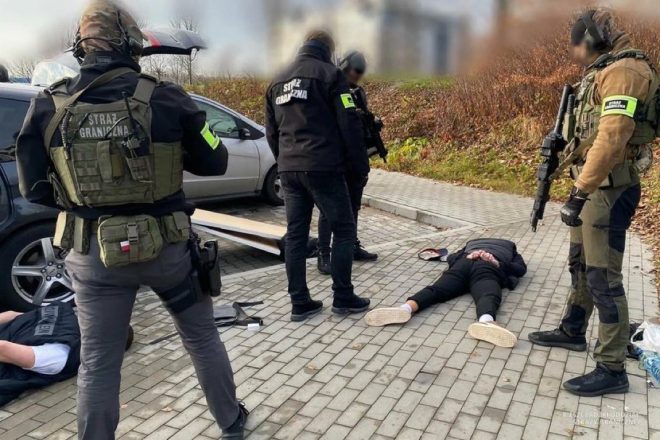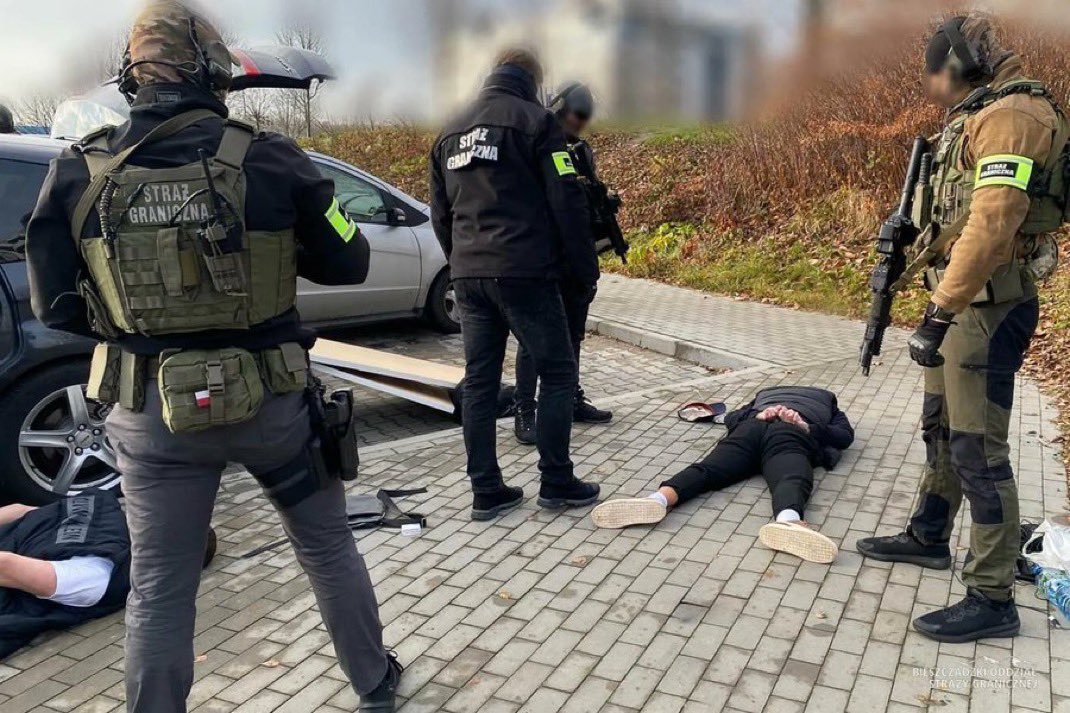
Poland Initiates Mass Deportation Raids Against Illegal Migrants
In a significant move to address illegal immigration, Poland has commenced extensive deportation raids targeting undocumented migrants. Over the past two days, Polish authorities have arrested approximately 400 individuals, marking a decisive action in the country’s ongoing struggle with illegal immigration. The arrested migrants are currently held in detention centers and are expected to be deported shortly.
Context of the Raids
Poland’s recent crackdown on illegal migration comes amid rising concerns over border security and the integrity of national immigration policies. The Polish government has been under pressure to strengthen its borders and manage the influx of migrants, many of whom enter the country without proper documentation. This new wave of deportation raids is a clear indication of the government’s commitment to enforcing immigration laws and ensuring that illegal migrants face consequences for their actions.
Details of the Operations
The operation, which involved both police and border guards, focused on areas known for high concentrations of illegal migrants. Authorities executed coordinated raids, utilizing intelligence gathered from previous encounters and surveillance. The strategy underscores a shift towards a more aggressive stance against illegal migration, aiming to deter future attempts by migrants to enter the country unlawfully.
Legal Framework and Implications
The deportation of illegal migrants is conducted within the framework of Polish immigration law, which allows authorities to detain individuals found to be residing in the country without valid permits. The recent arrests have raised discussions around the legal processes involved in detaining and deporting migrants, emphasizing the need for a balanced approach that respects human rights while enforcing immigration policies.
- YOU MAY ALSO LIKE TO WATCH THIS TRENDING STORY ON YOUTUBE. Waverly Hills Hospital's Horror Story: The Most Haunted Room 502
Public Reaction and Political Ramifications
The mass deportation raids have elicited mixed reactions from the public and political figures. Proponents of stricter immigration controls argue that these measures are necessary for national security and the protection of Polish citizens. On the other hand, human rights advocates express concern about the treatment of detained migrants and the potential for violations of international law.
The Polish government faces the challenge of addressing these concerns while maintaining its position on immigration. The balance between enforcing laws and respecting human rights will be a critical topic of discussion in the coming weeks as the public and political landscape continues to evolve.
Migrant Crisis in Europe
Poland’s actions are part of a broader trend seen across Europe, where several nations are grappling with the complexities of migration. The ongoing migrant crisis has led to increased tensions within the European Union regarding how to manage the flow of individuals seeking refuge and better opportunities. Countries like Poland are taking a hardline approach, reflecting a growing sentiment among certain EU member states that prioritize border security over compassionate responses to migration.
Future of Immigration Policies in Poland
As Poland continues its operations against illegal migration, the future of immigration policies remains uncertain. The government is likely to face increasing scrutiny regarding its methods and the humanitarian implications of mass deportations. Additionally, discussions within the EU about collective immigration strategies may influence Poland’s approach moving forward.
Conclusion
Poland’s launch of mass deportation raids against illegal migrants marks a pivotal moment in the country’s immigration policy. With 400 individuals arrested in just two days, the government is sending a clear message about its commitment to enforcing immigration laws. While these actions reflect a broader trend in Europe towards stricter immigration control, they also raise important questions about human rights and the treatment of migrants. As Poland navigates this complex landscape, the balance between security and compassion will be crucial in shaping the future of its immigration policies.
Stay informed about the latest developments in Poland’s immigration policy by following news outlets and social media channels that cover this evolving story.

BREAKING:
Poland has launched mass deportation raids against illegal migrants.
400 illegal migrants have been arrested by the police and border guard in the past 2 days and put in detention centers from where they will soon be deported.
— Visegrád 24 (@visegrad24) February 23, 2025
BREAKING: Poland Launches Mass Deportation Raids Against Illegal Migrants
Poland is making headlines as the country embarks on a significant crackdown on illegal immigration. In a swift move, Polish authorities have launched mass deportation raids, resulting in the arrest of approximately 400 illegal migrants over just two days. This decisive action has raised eyebrows and sparked discussions both domestically and internationally about migration policies and human rights implications.
The Context of the Raids
The recent deportation raids come in the wake of growing concerns within Poland about illegal immigration. With increasing numbers of people attempting to enter the country without proper documentation, the government has been under pressure to tighten its borders. The raids, conducted by police and border guards, have seen these individuals detained and placed in detention centers where they await deportation. The Polish government asserts that these actions are necessary to maintain law and order, but critics argue about the humanitarian aspects involved.
Details of the Operation
According to reports, over a two-day period, law enforcement agencies worked tirelessly to identify and detain illegal migrants across various regions in Poland. The operation was not merely a random sweep; it was well-planned and coordinated to ensure maximum impact. The migrants detained during this operation have been moved to detention centers from which they will soon be deported back to their countries of origin. This organized effort highlights Poland’s commitment to enforcing its immigration laws, but it also raises questions about the treatment of those detained.
Public Reaction
The public response has been polarized. Supporters of the government’s actions argue that these raids are necessary to protect national security and to deter future illegal immigration. They believe that a firm stance on immigration will help Poland maintain its cultural identity and safeguard its social services. On the other hand, human rights advocates express concern over the treatment of migrants during such operations. They argue that these actions could lead to violations of international human rights norms and call for more humane approaches to immigration challenges.
The Broader Implications for Polish Society
These deportation raids are not merely a legal issue; they reflect broader societal attitudes toward immigration in Poland. As a nation that has seen significant migration itself, particularly in the wake of the European Union’s expansion, the current crackdown highlights a shift in public sentiment. There is a growing discourse around nationalism and the perception of immigrants in society. This could have lasting implications for Polish politics and social cohesion as debates continue about who is welcome and who is not.
International Response
The international community is closely monitoring Poland’s actions. Various organizations, including the European Union and human rights groups, have expressed concern about the mass deportations. They are urging the Polish government to consider the humanitarian implications and to adhere to international standards for the treatment of migrants. The situation could put Poland at odds with its European partners, especially in a time when many countries are grappling with migration issues and seeking unified approaches.
Legal Framework Surrounding Deportations
Understanding the legal framework governing deportations in Poland is crucial. The Polish Constitution and various international treaties outline the rights of migrants. While the government is within its rights to enforce immigration laws, it must also ensure that these laws are applied fairly and humanely. The legal procedures for deportation must be transparent, and migrants should have access to legal counsel to challenge their detentions if necessary. This aspect of the legal framework is where many advocates see potential pitfalls with the current operations.
Future of Immigration Policy in Poland
The mass deportation raids signal a shift in Poland’s immigration policy, but what does the future hold? As public opinion evolves, the government may face pressure to adopt more comprehensive immigration reforms that address the root causes of migration, rather than solely focusing on enforcement. There is an opportunity for Poland to engage in dialogues about immigration that include perspectives from migrants, policymakers, and civil society. Such approaches could lead to more balanced and effective immigration policies.
The Role of Media in Shaping Narratives
Media coverage plays a vital role in shaping public perceptions of immigration. The framing of the mass deportation raids can influence how society views migrants and the government’s actions. Responsible journalism that presents facts and diverse perspectives can help create a more informed public discourse. As stories unfold, it’s essential for media outlets to strike a balance, ensuring that the voices of both supporters and critics of the raids are heard.
Conclusion: A Balancing Act
In summary, Poland’s mass deportation raids against illegal migrants represent a complex intersection of law enforcement, public opinion, and human rights. As the government navigates the challenges of immigration control, it must also be mindful of the implications its actions have on society at large. The ongoing dialogue surrounding these issues will play a crucial role in shaping the future of immigration policy in Poland, making it an essential topic for all who are invested in the country’s social fabric and human rights commitments.
This situation is evolving, and as more information becomes available, it will be essential to stay informed and engaged in the discussion surrounding immigration in Poland and beyond.
